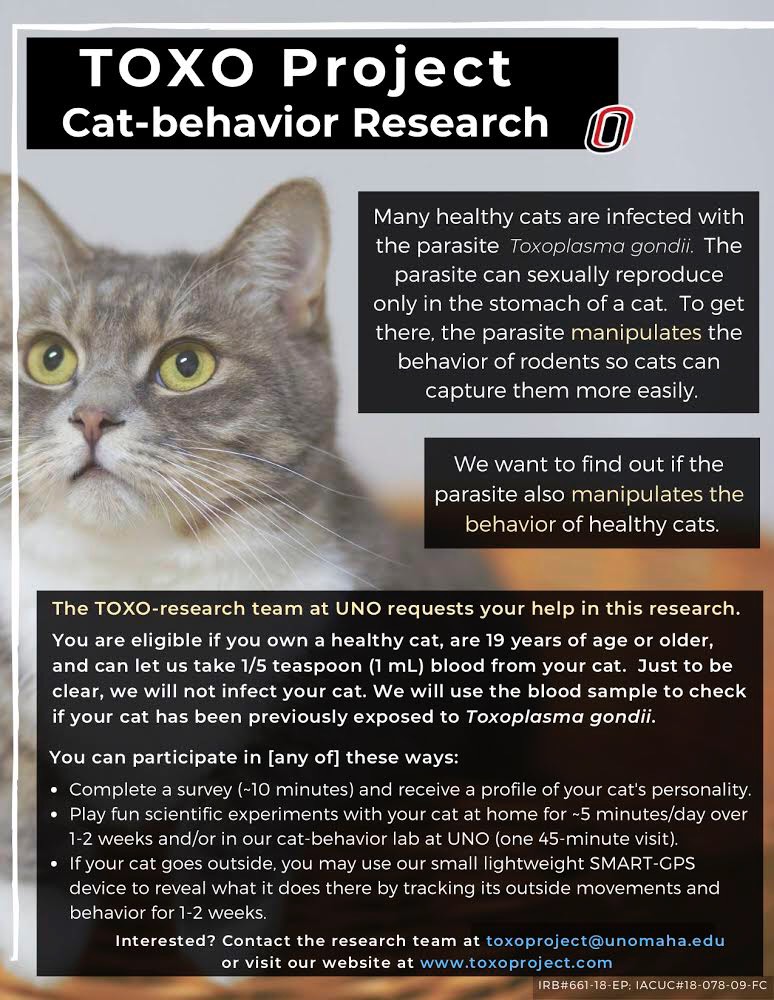- Do you subscribe to Dharma Dog Training’s Newsletter? You should.
- A Unique Campaign from The Humane Society of the United States
- Rabid bats in Omaha- Stay safe, prepared with these tips
- Springtime Activities in Omaha
- Mill Dog Monthly from Bailing Out Benji
- World Spay Day, Legislative Alert in Nebraska
- Attend the Nebraska Rescue Council’s monthly meeting this Saturday
- Five Hard-to-Ignore Reasons to Adopt!
- Paws in Pink to Benefit Breast Cancer Foundation
- VCA, Inc. Acquires MidWest Vet Specialists from Kansas State University
UNO Researches Behavior-Altering Parasites in Domestic Cats

Cat owners may be aware of toxoplasmosis, but outside of them, most people don’t know about it. According to the Mayo Clinic, Toxoplasmosis (tok-so-plaz-MOE-sis) is “a disease that results from infection with the Toxoplasma gondii parasite, one of the world’s most common parasites. Infection usually occurs by eating undercooked contaminated meat, exposure from infected cat feces, or mother-to-child transmission during pregnancy.”
It’s fairly common and symptoms of the disease can vary. Researchers at the University of Nebraska at Omaha are interested in learning whether the infection affects the behavior of domestic cats. They hope to clear up some popular misconceptions concerning the disease in cats and humans.
“Our goal,” said Mohammad Alyetama, the principal investigator of the study and a graduate student in the Neuroscience & Behavior program within the Department of Psychology, “is to use a citizen-science approach to answer these questions using the least invasive method possible – in a way that does not infect cats or affect their well-being.”
It is well established that infection by Toxoplasma gondii (T. gondii) affects risk-averse behavior in rats and mice. For example, infected rats lose their ability to avoid objects marked with cat urine. Infection also affects their memory, locomotor activity, anxiety, innate-fear response. Strikingly, it induces a fatal sexual attraction to the scent of cat urine. Since this makes the rodent more easily captured by the cat, it facilitates the transmission of the parasite to the cat – the only host where the parasite can sexually reproduce.
Alyetama and his advisor, Dr. Bruce Chase, have been developing their project for over a year, and only recently started collecting data. Alyetama and Chase recently told us about their plans for the study and what questions they are asking.
“Our research addresses a critical gap in understanding about the transmission of T. gondii. While the parasite is known to affect the behavior of rodents and some other animals including humans, nothing is known about whether an infection in cats affects cat behavior.” Alyetama and Chase’s main hypothesis is that infection in domestic cats affects cat behaviors that increase parasite transmission.
“For this reason,” Alyetama said, “we are also interested in engaging the community in this research. We are taking a ‘citizen-science’ approach to address our main research question.” In this approach, cat owners will take part in the research and collect data in a scientific manner. It’s important to note that the researchers do NOT infect animals with T. gondii. Since a reasonable percentage of pet-cats already have been exposed to the parasite, this citizen-science approach lets the researchers sample both exposed and unexposed cats.
In a few weeks, the team will start tracking indoor-outdoor cats in the Omaha area. These UN-Omaha researchers are collaborating with both national and international partners to do that. One partner has already established a project to track cats (Cat Tracker). Researchers plan to use even more advanced tracking devices – tri-axial GPS-accelerometers. These devices are able to report the posture and position of the animal and allow researchers to infer different natural behaviors of the cat when it goes outside the house.
In addition to tracking cats outside, the team is also currently pursuing three additional non-invasive approaches to address the main question of their study. One of these involves cat owners bringing their pets to UN-Omaha for a behavioral study. Another involves asking cat owners to video record the behavior of their pet as they play specific games with it. The last one is for all folks over 19, whether or not they own a cat. This is to help correct popular misconceptions about infection by T. gondii.
Published estimates indicate that 16-80% of cats in the United States are infected with T. gondii. Since cats are the obligate host for the sexual portion of this parasite’s life cycle, researchers at UN-Omaha think that it is important to raise awareness about the disease to reduce the risk of infection from cats.
A recent survey of obstetricians and gynecologists in the US to assess their knowledge and practices relating to prevention and testing of Toxoplasmosis found that the majority of participants had overestimated pet-cat ownership as a risk factor compared to other known environmental risk factors (eating unwashed fruit and vegetables, eating rare meat, etc.).
Also, there was a low level of knowledge about other risk factors than cats; in one study, only 30% of pregnant women were aware that T. gondii might be found in raw or undercooked meat. In fact, we know that veterinarians commonly get questions from clients as to whether they should get rid of their cat during pregnancy, but usually, when hygiene and prevention recommendations are followed, the risk of transmission is low. Studies in the US have shown that most (85%) pregnant women are susceptible to infection; however, many congenital T. gondii infections acquired during gestation are preventable by taking simple precautions.
For that, the team has developed a brief, appealing online survey to educate owners, prospective owners, and even non-owners who might come in contact with T. gondii. The team encourages anyone over 19 to take the 13-questions survey (www.toxoproject.com/survey) to learn more about:
- What you need to know about toxoplasmosis and
- How this research could impact your life as a member of a household with cats.
The survey provides practical details that cat owners need to be aware of in relation to Toxoplasma gondii.
Check back in about a year to get an update on what Alyetama and Chase have found out about this fascinating behavior-altering parasite!

Latest News
-
3 Tips for Pet Owners on Training Rescue Dogs
Owning a rescue dog can take some work compared to...
- Posted 1 week ago
- 0
-
Choosing the Right Pet for Your Lifestyle
Are you thinking about getting a pet but unsure what...
- Posted 3 weeks ago
- 0
-
How to Make Your Rescue Pet as Comfortable as Possible
Did you bring home a new pet from a shelter...
- Posted 1 month ago
- 0
-
How Having A Pet Can Change Your Life
Having a pet can open your heart in ways that...
- Posted 7 months ago
- 0
-
How To Improve The Life Of Your Senior Pet
Do you have an elderly fur baby and want to...
- Posted 7 months ago
- 0
-
Springtime Activities To Enjoy With Your Furry Friends
Are you preparing for warmer weather and want some ideas...
- Posted 8 months ago
- 0
-
Pros And Cons Of Microchipping Your Pets
Have you considered whether your pets should be microchipped and...
- Posted 9 months ago
- 0


















You must be logged in to post a comment Login